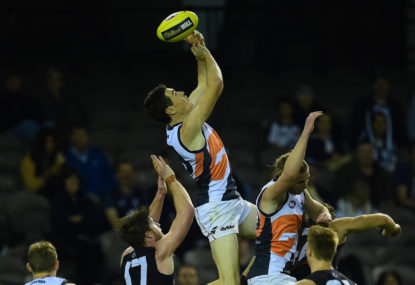The crucial cogs of AFL's Round 7: Which players need to be the difference makers?
We’re taking a look at one player from each team that needs to make a difference this week, starting with the ANZAC Day games.

There’s never any shortage of overreaction when things go well Greater Western Sydney. We all know how immense the talent is on their list and the power they’ll be when things click for good.
It’s only Round 6 and there are plenty of ups and downs to come over the next 17 rounds, but Saturday’s performance was too significant to ignore.
What the Giants did to the defending champs was frightening. The 75-point margin was the Hawks’ heaviest defeat since Round 14, 2009, and GWS’s 158 points were the most a team has piled on against Hawthorn since Round 13, 2005.
But it was more to it than just the numbers. The Giants made the Hawks look inept. They overpowered and outworked them at the contests (+39 contested possessions, +18 clearances, +22 tackles) and outran them on the outside – led by marathon man Tom Scully, who is in All-Australian form.
Whether the game said more about the Giants or the Hawks, we’ll find out as the season unfolds, but it’s not unreasonable to wonder whether GWS can win the whole damn things this year.
It’s easy to dismiss such ideas by pointing to club’s postseason inexperience. Of the players who have taken the park for GWS so far this season, only six have appeared in a final, for a total of 70 games. But is the experience of the Western Bulldogs – who many consider a contender – really so significantly superior?
Of the Dogs to play this season, 19 have played in a final for a total of 69 games – and that includes ten from skipper Bob Murphy, whose 2016 is over. Twelve of those Bulldogs have appeared in just one final. Should the Giants finish in the top four, they’ll have just as much experience by the second week of finals as the Dogs do now.
Additionally, only one Bulldog (Matt Suckling) has tasted premiership success, compared to three from the Giants (Steve Johnson, Heath Shaw and Shane Mumford).
GWS have talent on every line and an edge to their game which should stand up in the heat of finals footy. There’s a long road ahead, but the Giants are a huge threat.
GWS weren’t the only contenders to flex their muscles on the weekend.
On Friday night, the undefeated Kangaroos showed they are as comfortable in a scrap as a shootout, as they gave the Bulldogs a taste of their own medicine under the roof at Docklands.
Daniel Wells and Jarrad Waite were the headliners, but Andrew Swallow and Ben Cunnington – who each laid 14 tackles – were every bit as crucial to the cause.
Through pressure both real and inferred, North Melbourne forced the Dogs to fumble the footy time and again. When the Bulldogs did have the ball, North forced them into bad decisions or mistakes. Scott Thompson and Robbie Tarrant controlled the defensive 50, with plenty of help from Luke McDonald, who might have played his best game.
It wasn’t a pretty win, but it was a significant one. Six-zip is a hell of a platform.
Twenty-four hours later, the Cats won an entirely different game of footy, blowing the disappointing Suns off the park by 20 goals.
Joel Selwood and Patrick Dangerfield – who might be footy’s best player – again led the charge in the middle, but the dynamic duo’s supporting cast of Cam Guthrie, Mitch Duncan, Josh Caddy and Mark Blicavs continue to pull their weight. Jimmy Bartel was terrific and Steven Motlop dynamic.
It’s too early to say whether the contested ball and clearance problems of 2015 have been solved – they got touched up by the Giants in those areas in Round 2 – but at least they are on the right side of the ledger thus far in each category.
After a so-so (by his standards) 2015, Harry Taylor is again looking like a premier key defender, Lachie Henderson played his best game as a Cat, and evidence is mounting that Corey Enright is, in fact, a cyborg.
They look a little slow in the defensive 50, but if they can maintain the pressure up the field that they put on Gold Coast – who, it must be reinforced, were dreadful – that might not be such an issue. Only the Bulldogs have conceded fewer inside 50s than the Cats, who let the ball into their defensive arc just 42.5 times a game.
Quietly, Geelong are the second stingiest team in the competition through six games, conceding only 63.3 points a game, while sitting fourth for points scored at an average 110.7.
The Cats might once again be the team to beat.